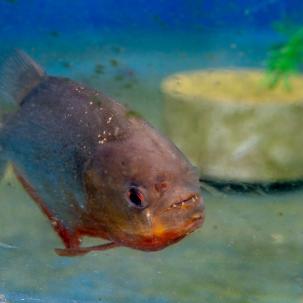MORRISVILLE, N.Y. — An abandoned piranha, found by a student on the doorstep of an aquarium store, has found a new home in SUNY Morrisville’s aquaponics greenhouse.
Assistant Professor Elisa Livengood obtained a permit from the Department of Environmental Conservation and adopted the fish, which will augment lessons in her aquatic science & aquaculture classes and labs.
“Maybe this fish got too big for its tank. Maybe the person had to move,” Livengood said. “Either way, they possibly didn’t do their research before owning it to know they are illegal in New York State without a permit.”
The piranha will help her teach students about invasive species and the responsibilities that come with owning a pet.
“Even fish are a commitment,” said Livengood, who, along with hatchery staff, has been caring for it until students return from winter break on Feb. 8.
Among their first lessons will be how to feed the nearly full-grown piranha, which is eating frozen blood worms for now. Later, they will determine its gender.
“It’s pretty tricky to tell males and females apart until the female develops eggs,” Livengood said.
The next step is to give it a name and consider adding to the tank.
“We think it needs some piranha friends, as they typically like to school or swim together in groups of six or more,” Livengood said.
The piranha is just one of many unique components in Livengood’s lab this semester. A new spawn of orchid dottybacks, a fluorescent pink fish important in the aquarium trade, and thousands of newly hatched brook trout await students’ care, as well as two new spawns of seahorses.
Tank-bred seahorses made their way to Livengood’s labs in 2018 and are providing students with applied research opportunities and lessons about breeding the species in captivity, vital information for the future of the aquarium industry and for conservation.
Livengood has been driving student interest in aquatic life since she joined the SUNY Morrisville faculty in 2015.
In addition to her unique lab experiences, aquaculture students gain hands-on skills in the college’s cold water trout hatchery and the controlled environment agriculture (aquaponics) greenhouse, where they continue to research the propagation of paddlefish as a viable aquaponics species for caviar and food.

